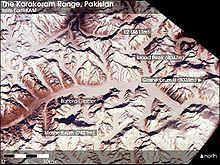



Pakistan is home to many mountains above 7,000 metres (22,970 ft). Five of the world's fourteen mountains taller than 8,000 metres (26,000 ft) ("eight-thousanders") are in Pakistan, four of which are near Concordia.
Most of Pakistan's high peaks are located in the Karakoram range, the highest of which is K2 8611 meter long (8,611 metres (28,251 ft)), the second-highest peak on earth. The highest peak of Himalayan range in Pakistan is Nanga Parbat (8,126 metres (26,660 ft)), which is the ninth-highest peak of the world.
Following are the mountain ranges that are fully or partially included in Pakistan:
- Karakoram, including the world's second-highest peak, K2 (8,611 m or 28,251 ft)[1]
- Himalayas; highest peak in Pakistan is Nanga Parbat (8,126 metres (26,660 ft))[2]
- Hindu Kush; highest peak is Tirich Mir (7,708 metres (25,289 ft)).
- Hindu Raj in northern Pakistan, part of the eastern Hindu Kush, highest peak is Koyo Zom (6,872 m (22,546 ft)).
- Spīn Ghar, starting from Tora Bora on the border with eastern Afghanistan west of the Khyber Pass, highest peak is Mount Sikaram (4,755 m (15,600)) .
- Sulaiman Mountains; highest peak is Takht-e-Sulaiman (3,487 metres (11,440 ft)).
- Margalla Hills in Punjab whose highest peak is Tilla Charouni (1,604 metres (5,262 ft))
- Salt Range, a hill system in the Punjab Province that is abundant in salt; highest peak is Sakaser (1,522 metres (4,993 ft))
- Toba Kakar, a southern offshoot of the Hindu Kush in Balochistan
- Makran Range, a semi-desert coastal strip in the south of Balochistan, in Iran and Pakistan near the coast of the Arabian Sea. The narrow coastal plain rises very rapidly into several mountain ranges. Of its 1,000-kilometre (620 mi) extent, about 750 kilometres (470 mi) is in Pakistan
- Ras Koh Range
- Chagai Range
- Kirthar Range, located along the Balochistan and Sindh provincial border. It runs north-south for about 300 kilometres (186 mi) from the Mula River in east-central Balochistan south to Cape Muari (Cape Monze) west of Karachi on the Arabian Sea. The Hill Station of Sindh at Gorakh, in Kirthar Mountains Range, off Dadu, at the height of 5,688 feet (1,734 m), averaging 5,500 feet (1,700 m), is one of the two large plateaus in the Sindh segment of Kirthar mountains.
- Kirana Hills, The Kirana Hills is a small and extensive rocky mountain range located in Chiniot and Rabwah, Pakistan. Kirana-I nuclear tests were conducted in these hills.
- ^ BBC, Planet Earth, "Mountains", Part Three
- ^ Sanskrit, Tamil and Pahlavi Dictionaries